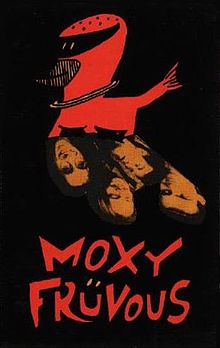 Vancouver, summer of 1992. My sisters and I took our collective brood down to Granville Island for lunch and diversion: artists and crafters at work, strolling players, seagulls and sunshine, ships busy in the harbour, a zillion flavours of ice cream. And, most magically, four young men under a marquee on the seafront, singing witty, tuneful songs and charming our kids with their lighthearted shtick. I bought their audiocassette, which they all autographed; I still have it. The band was Moxy Früvous, and one of the signatories was Jian Ghomeshi.
Vancouver, summer of 1992. My sisters and I took our collective brood down to Granville Island for lunch and diversion: artists and crafters at work, strolling players, seagulls and sunshine, ships busy in the harbour, a zillion flavours of ice cream. And, most magically, four young men under a marquee on the seafront, singing witty, tuneful songs and charming our kids with their lighthearted shtick. I bought their audiocassette, which they all autographed; I still have it. The band was Moxy Früvous, and one of the signatories was Jian Ghomeshi.
Fast forward to 2014. The kids are all grown up, Moxy Früvous is long defunct, and Jian Ghomeshi is…well, until just over a week ago, a national darling, a CBC superstar, one of the brightest bods of the Canadian media, the mop-headed second-day-stubble-chinned maestro of the celebrity radio interview. Then came the scandal: Jian Ghomeshi as the violent abuser of women, hiding behind his own brand of consensual BDSM. He’s nobody’s darling now.
The CBC has fired him. He has been dropped from the Giller Prize gala and the Polaris Music jury; disinvited to fundraisers  in Thunder Bay, Edmonton, and Prince George; cut loose by two PR companies, his agents, and his publisher; and repudiated by a long list of Canadian musicians and writers, including the rest of Moxy Früvous. Friends and fans, right up to the leader of the national Green Party, have withdrawn their support. The police are taking a strong interest. He’s losing traction on Facebook. And he has lost the good will of a vast number of grassroots Canadians, including me.
in Thunder Bay, Edmonton, and Prince George; cut loose by two PR companies, his agents, and his publisher; and repudiated by a long list of Canadian musicians and writers, including the rest of Moxy Früvous. Friends and fans, right up to the leader of the national Green Party, have withdrawn their support. The police are taking a strong interest. He’s losing traction on Facebook. And he has lost the good will of a vast number of grassroots Canadians, including me.
It may be hard to explain to non-Canadians why this has been such a coast-to-coast trauma. The CBC is widely seen as the duct tape that patches us together into something resembling a nation, and Jian Ghomeshi has been more than a household name—he has been an icon, virtually a distillation of the Canadian identity. Therefore, as the story developed, the nation went through an interesting series of knee-jerk reactions:
- The CBC announces Ghomeshi has been fired. Shock and dismay. For most of us, this is entirely out of the blue. What on Earth could be bad enough to get a great guy like Jian fired? Probably Harper’s fault. Damn that CBC brass. Go, Jian, the country’s behind you!
- Jian Ghomeshi posts his side of the story on Facebook: yes, okay, he tells us he’s got a weird sex-life, but only with consenting women, and his accuser is no more than a vengeful ex-lover out for blood. More shock, more dismay. Over 100K likes for his Facebook post. Poor Jian, losing his job over a false accusation! Bitch be crazy. But to many, including me, the FB post raises red flags. As does Jian’s declared intention to sue the CBC for fifty million dollars. And, consenting adults or not, he has damned himself out of his own mouth: do we want our news and views from a guy who gets his rocks off by smacking women around?
- The Toronto Star investigative journalists publish their story. Now allegations from four anonymous women are involved, including one claiming workplace harassment, and all deny that they consented to rough sex. Opinions among CBC-philes rapidly diverge into those crediting the women (Believe the victims!), those believing Ghomeshi (Nobody went to the cops!), and those wishing to reserve judgment pending further evidence. I find myself in the third category.
- More accusers come forward. Suddenly there are eight accusers, two of whom do not remain anonymous, and they tell stories that are both credible and compelling. Further details emerge, including something monumentally creepy about a stuffed bear named Big Ears Teddy. And all at once it seems that everybody in the CBC and the Toronto arts scene always knew Jian was weird with women, and a prima donna, a monster to work with. His support base erodes further.
- He is dumped by his crisis-control PR specialists, on the grounds that he has lied to them—and when people whom he paid to believe him think he’s lying, what are other reasonable people to conclude? Skeptics like me come to the reluctant conclusion that he is, indeed, a sleazebag with self-serving ideas about what constitutes consent, and the CBC acted correctly in cutting him off. And, although fans and fence-sitters remain, that is pretty much the current consensus.
Is this trial-by-media? Sort of. A subversion of the presumption of innocence? Not really. A good many of us began by presuming Ghomeshi’s innocence, and changed our minds when that position became untenable. You need court-proof evidence to send somebody to jail—you do not need it to conclude that he is an asshole, and not the sort of person to front a high-profile national broadcast.

Anyway, one part of the story—whom to believe—is no longer up for much debate, but other wrangles are only just beginning. What does it all mean? What does it say about society, men, women, rape culture, consent, BDSM? Inevitably, a large dose of political correctness has entered the mix. Out of all the burgeoning threads of commentary, I’d like to look at three quotes.
First, there has been some breast-beating by commentators who did not automatically jump to believe the accusers. For example:
Last week I came face to face with my own bias and I was left with a deep sense of regret and shame. I consider myself an ardent supporter of women’s rights and being a survivor of sexual violence myself, one would think that I would have rushed to believe the women that Jian Ghomeshi allegedly sexually assaulted. But I did not. In fact, I doubted their credibility. And for this, I am ashamed.
Why? When such a grave accusation is made, skepticism should be the default reaction until credible evidence is presented. For most of us, this accusation was a thunderbolt from a clear blue sky, against a man whom we (naively) thought we knew. When sufficient evidence was presented, the tide of opinion turned within days.
Second, predictably, some commentators see the Ghomeshi saga as slam-dunk evidence of rape culture: endemic violence against women and the silencing of victims’ voices. For example:
The real story here is not about the fall of a Canadian cultural icon, or a “jilted ex,” or CBC’s comfort level with BDSM or kinky sexual practices. I would go so far as to argue that this story isn’t really even about Jian Ghomeshi. Why? Because when his celebrity is dislodged from the centre of the conversation, something else becomes painfully apparent: sexual violence against women in Canada is at once widespread and terribly normalized.
Normalized? If anything, the widespread revulsion directed towards Ghomeshi in the last few days points in exactly the opposite direction. And on what grounds should we dislodge his celebrity from the centre of the conversation? How reasonable is it to generalize from this privileged and protected media princeling to the other seventeen million-odd males in the country, the overwhelming majority of whom abominate sexual violence? In fact, Ghomeshi’s celebrity is critical to the conversation.
Which brings me to the third point. On the evidence, Ghomeshi was able to carry on beating women up for years because he was a celebrity—because we humans tend to gift the charismatic and powerful with license to be bad, to ignore the social contracts that bind the rest of us. His brew of sexual violence, narcissism, and voracious entitlement has much in common with that of cult leaders and, say, certain CEOs and politicians, making him more of a Roch Theriault than a Joe Blow. Certainly we need to talk about mainstream sexual violence—but we should also think about a separate conversation regarding the pathologies of our relationship with power.
So I’m taking the last quote from a sock puppet. Yes, really. Ed the Sock, that great Canadian sage and social commentator:
…The TV biz is way too tolerant of shitty behaviour by ‘stars’. They’re allowed to get away with things because applying common standards of decency to them might somehow rob them of their muse, putting everyone out of work. This also applies to some executives who are left in place because they get results, regardless of the pirate galley they run…. So why don’t we use the Jian Ghomeshi revelations for more than some vindictive snickers, which I’ve engaged in too, and open a discussion about the workplace-enabling of assholes?
